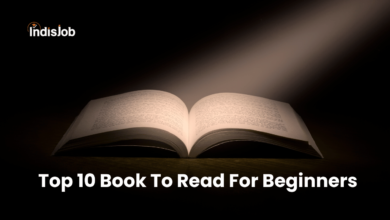Top 10 Best Books On Investing That Will Teach You Real Investment

For new investors, what’s the best book to read first? What are the best books on investing overall? What are the best books on specific types of investments? This list of the 10 best investing books covers all these bases and more, so you can start filling your bookshelf with everything you need to succeed in this exciting field.
10 Best Books On Investing & Wealth Creation:
To become a successful investor, one must first start with what kind of individual they are or want to be as an investor. There are many differences between those who like trading shares constantly instead of those who like investing in stocks and letting them sit for years. In these books, you can learn everything about investment and wealth creation. Here read our top 10 best books on Investing:
-
Think and Grow Rich – Napoleon Hill
Napoleon Hill’s book, Think and Grow Rich, is at once a self-help book and a guide on how to invest in shares. Hill was one of the earliest thinkers to understand that stocks were one of the best ways to build wealth because they were easily traded. He realized that you don’t have to work for someone else to create wealth; all you need is an idea and some capital.
-
The Intelligent Investor – Benjamin Graham
One of Warren Buffett’s favourite books. The Intelligent Investor is one of Graham’s two most famous works and also happens to be a required text at Yale University.
The Intelligent Investor: A Book of Practical Counsel (Revised Edition) (The Intelligent Investor) by Benjamin Graham, Jason Zweig focuses on fundamental analysis for long-term investments with a primary focus on value investing.
-
Security Analysis – Benjamin Graham, David Dodd
This is an essential book for all investors. It gives a framework for how security analysis should be done. This book can help you develop an investment strategy, even if you plan on using quantitative analysis and technical indicators to make buy/sell decisions.
This book is helpful in that it advises on when markets are good or bad, which strategies work well in different types of needs, and what stocks tend to do well in those environments. I highly recommend reading Security Analysis as part of your development as an investor.
-
Buffett – Alice Schroeder
The Snowball. This book is incredibly detailed and in-depth, covering everything you could ever want to know about Warren Buffett’s personal life. As a bonus, it gives you some perspective on what it’s like working with Warren Buffett, who might be one of my all-time favourite investors.
-
Against the Gods – Peter L. Bernstein
This classic book by Wall Street veteran and former Salomon Brothers executive Peter L. Bernstein is considered a must-read for any severe investing student.
It explains some of history’s most notable financial disasters in detail, including John Law’s Mississippi scheme, Tulipmania, and Charles Ponzi’s infamous swindle.
-
A Random Walk Down Wall Street – Burton Malkiel
Burton Malkiel, the author of one of finance’s most popular investment books, has a way with words. Drawing from academic research, real-world examples, and a sly sense of humour, Malkiel lays out his case for a passive investing strategy that can help you achieve your long-term financial goals.
Written over four decades ago, A Random Walk Down Wall Street remains one of Finance 101’s must-reads: It hasn’t lost its touch.
-
The margin of Safety – Seth Klarman
Seth Klarman’s Margin of Safety is one of my favourite business ethics books. One of his quotes that have stuck with me was: Investors should remember that excitement and expenses are their enemies.
And if they insist on trying to time their participation in equities, they should try to be fearful when others are greedy and greedy only when others are fearful. In other words, don’t buy high and sell low.
-
One Up On Wall Street – Peter Lynch
Lynch’s book is widely considered one of, if not the best, books on investing. One Up On Wall Street explains how Lynch used straightforward tips and techniques to beat out professional investors by picking his stocks—and because it worked so well for him, Lynch made millions of dollars at Fidelity. The book has been around since 1983, but it remains as relevant today as ever.
-
Where Are the Customers’ Yachts? – Fred Schwed Jr.
Still funny and thought-provoking after all these years, Where Are The Customers’ Yachts? is a fantastic book that takes a look at Wall Street from a broker’s point of view. Given its sometimes hilarious language, it might not be for everyone, but it’s a quick and easy read that puts things into perspective.
-
The Little Book of Common Sense Investing – John C. Bogle
It’s widely considered one of the best investing books. Bogle is a proponent of index funds and has a lot of great investing advice.
If you want something quick that won’t take too much time or reading but still gives excellent advice and value, check out Bogle’s The Little Book of Common Sense Investing. (Buy on Amazon) A Random Walk Down Wall Street – Burton Malkiel: Not for beginners, but an excellent book for intermediate to advanced investors.
Final Words: 10 Best Books On Investing
Reading is a lifelong habit that everyone should have. And if you want to get good at something, it’s best to learn from people who have already done it. That’s why I recommend investing books as one of my top 10 best tools for learning how to invest.
Not only are they packed with important information, but they also come from people who have been there and done that – so they know what they’re talking about.
Everyone has something different that draws them to reading. Some readers want a healthy escape, some want inspiration, and others seek enlightenment.
Whatever you’re looking for in a book, there are at least a dozen books on investing that will scratch your itch. Regardless of why you’re reading, it’s not enough to pick up any book on investing; if you want to get something out of it, you need to find a great book and stick with it.
The best place to start is by building an investment plan around your goals – then look for strategies that align with your approach!
For More Updates Follow us on Facebook, Instagram & LinkedIn.
Also Read:
- Top 10 Best Books On Marketing That Will Teach You All About Marketing
- Top 10 Best Books on Parenting for New Parents
- How To Become A Journalist In India – Step By Step Guide
- 25 Most Asked Selenium Interview Questions and Answers For Interview Preparation
- Appointment letter – Download Appointment letter Format in PDF & Doc







